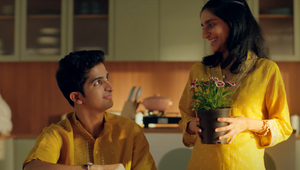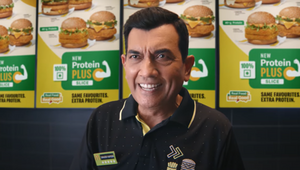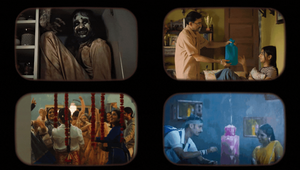
Planning for the Best: Mehak Jaini on Why the Role of a Strategist Doesn’t End at the Brief

With over eleven years of diverse strategy experience, Mehak Jaini has played an integral role in the evolution of strategy at 22feet Tribal Worldwide India. Her current mandate includes the group’s new business agenda and anchoring strategy for some of its largest businesses.
Frequently awarded, she was Impact Magazine’s Top 30 Under 30 Future Leaders Advertising 2014 and part of the Omnicom’s Emerging Stars Program 2013. This year, she was shortlisted for the Economic Times Emerging Women Leader Award.
An adventure junkie and animal lover, when she’s not at her workstation, you might find her exploring new depths underwater.
LBB> What do you think is the difference between a strategist and a planner? Is there one?
Mehak> Most people use the two terms interchangeably. But I believe there is a huge difference. While the account planning discipline was a crucial addition and an evolution of how an agency works (in the late '60s and early '70s), today most agencies have worked hard to get a seat at the CEOs table and strategy has been at the heart of that shift. Strategy sees the bigger picture, the interconnectedness of things and builds a brand’s larger business, brand and marketing strategy. It is the basis for the brief, defining where we want to go and how we will get there. While planning is often restricted to building on the brief post facto, further defining the direction. At DDB, we stopped using the term planner over 10 years back, and constantly reiterate what a strategist brings to the table, versus mere planning. This in no means is to belittle the planning function, and if we don’t get lost in words, we will notice great planners are the ones who strategise and move beyond the expected, while planners can fall in the trap of being hired campaign contractors. There is a thin line, but it is getting clearer and clearer.
LBB> And which description do you think suits the way you work best?
Mehak> Strategists, 100%. My best client agency partnerships have been those where the client truly sees us as their marketing and success partners. And that has happened on the back of strategy engaging on deeper things beyond the campaign.
LBB> We’re used to hearing about the best creative advertising campaigns, but what’s your favourite historic campaign from a strategic perspective? One that you feel demonstrates great strategy?
Mehak> It’s always tricky to pick a favourite, but the easiest short code to unravelling one’s favourite is to think of “which campaign / brand I wish I had created” and I always find my answer. For me it would be hands down “Cadbury – Kuch Meetha Ho Jaye (lets have some sweet?)”. Initiated in 2000, it was a complete gamechanger for the category. The brand smartly repositioned chocolate by contextualising and building it as Meetha (common phrase for every day sweet in India), juxtaposing chocolates with every day meetha – rituals, occasions, moments and emotions.
Cadbury – kuch meetha ho jaye – one of many films
Another favourite would have to be Marmite Lovers or Haters campaigns. A deep and rich understanding of Marmite and people’s relationship with the spread and how the brand boldly owned the emerging polarisation. adam&eveDDB have consistently delivered innovative campaigns on the same narrative while ensuring the brand remains consistent.
Recent example – Marmite Gene Project
LBB> When you’re turning a business brief into something that can inform an inspiring creative campaign, do you find the most useful resource to draw on?
Mehak> This is a really tough question, because there is no one resource. The process to arriving at an inspiring direction for creative is nonlinear, holistic, collaborative and at times chaotic but extremely fulfilling. I rely on all resources around me be it quick conversations with people, or simply observing life around me, tapping into subject matter experts, first party data, social listening or even the good old research report. But there is one resource that serves as a great starting point, especially when I am crunched for time and that is search data. Search is interesting, since consumer intent is already clear and it can help reveal various associations, connections one wasn’t even aware of. I use the Answer The Public tool and it has been a great hack for uncovering some interesting behaviours. The other tool is Q™ - developed by Omnicom’s cultural intelligence consultancy Sparks & Honey. Q™ uses the best of big data and human intelligence to quantify and predict cultural changes by scanning and surfacing data and conversations that are culturally relevant – unlike social listening or Google Analytics.
LBB> What part of your job/the strategic process do you enjoy the most?
Mehak> While I love every aspect of the strategic process, if I had to pick one it would be identifying the problem. A lot of times I find we go head first into finding the solution, without a deep appreciation of the problem. I truly believe that strategy is futile if we haven’t been able to identify what we're solving. Once that is done, its normally a cake walk.
LBB> What strategic maxims, frameworks or principles do you find yourself going back to over and over again? Why are they so useful?
Mehak> I do use a cross section of frameworks, depending on the category / the task. But I have often found myself going back to defining some of the fundamentals of the strategy – be it defining the problem, like mentioned in the question above, or defining one’s source of business, or using the brief shorthand of Get-To-By. Since we all know most decisions are emotional, guided by system 1 thinking, I do find it useful when I can clearly articulate what I want people to “feel”, and this thinking comes together quite well in DDB’s move beyond reason brief.
LBB> What sort of creatives do you like to work with? As a strategist, what do you want them to do with the information you give them?
Mehak> As a strategist, our role is to develop marketing / communication that influences the target audience into action. And I would think it’s no different if we consider our creatives as our first target audience. I enjoy working with all sorts of creatives, and enjoy understanding what drives them, their working style, their priorities to create a process and a brief that’s gets the best out of them. Irrespective of the type of creative, I have found most to be curious, participative and hungry to create something new and remarkable. But above all, I do truly appreciate a sparring partner when it comes to creative, someone who can push me and the thinking to greater heights.
LBB> There’s a negative stereotype about strategy being used to validate creative ideas, rather than as a resource to inform them and make sure they’re effective. How do you make sure the agency gets this the right way round?
Mehak> Not sure if it is a stereotype, but I do feel it is linked to an agency’s culture and the process it employs. If the agency is built on creative strength alone, with little regard for strategic thinking, you will often find yourself in this situation. An agency needs to invest in its strategic talent, groom and guide them to become true partners of the creative process. The role of a strategist doesn’t end at the brief, because the best creative process is a collaborative one, where one builds off one another. A strategist must understand what is value adding vs value depleting inputs in a creative process, always elevating their role in the process and ensuring they don’t become another cog in the machine.
LBB> What have you found to be the most important consideration in recruiting and nurturing strategic talent? And how has Covid changed the way you think about this?
Mehak> Covid hasn’t really changed how I think about new talent. When recruiting, I lay more emphasis on the right attitude, rather than aptitude, because skills can be taught on the job, what is difficult to come by is curiosity, hunger, persistence, and passion. I look for observers, who pick up on things regular people might not. And I try and ensure each individual in the team brings their sense of diversity and uniqueness to the table, actively seeking out diverse backgrounds, interests and journeys.
LBB> In recent years it seems like effectiveness awards have grown in prestige and agencies have paid more attention to them. How do you think this has impacted on how strategists work and the way they are perceived?
Mehak> If creativity isn’t effective, its art and not creativity in service of business. At DDB, we believe creativity to be the most powerful force in business – the one legal competitive advantage that brands have. And put a lot of importance on effectiveness Awards. In India we were the 2nd most awarded agency at Effies 2020. But this focus on effectiveness hasn’t dramatically changed over the years, what’s changed is the measurement tools available to us. Through DDB Mudra Group’s Data POEM tool, we can isolate marketing initiatives and accurately measure their individual impact on business, brand and social metrics.
LBB> Do you have any frustrations with planning/strategy as a discipline?
Mehak> Not really, like all great jobs, it throws new challenges at you every day and you get to test your strategic prowess. The only thing I find frustrating, but also a great opportunity to evolve and innovate – is the speed of marcom today. Things change quite fast in today’s day and age, requiring brands to be agile with their communications. But this agility often comes at the cost of crunched timelines in terms of thinking and ideating. How does a strategist navigate this while having a firm view on the short and long term impacts on the brand?
LBB> What advice would you give to anyone considering a career as a strategist/planner?
Mehak> Just keep swimming
Unlike most jobs, strategy doesn’t follow a defined playbook. Yes there are frameworks, models, templates, to guide your thinking. But the more you experiment with them, the more projects you take on, the more you grow, and create your own language of thinking. In your initial years be open to new, be hungry for more, take on new projects that excite you and offer to lead the ones that scare you. Your initial years can really expose you to varied type of projects and jobs, use that to your advantage.















